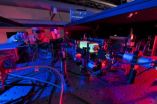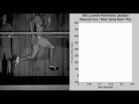(Press-News.org) A unique experiment at the U.S. Department of Energy's Fermi National Accelerator Laboratory called the Holometer has started collecting data that will answer some mind-bending questions about our universe – including whether we live in a hologram.
Much like characters on a television show would not know that their seemingly 3 - D world exists only on a 2 - D screen, we could be clueless that our 3 - D space is just an illusion. The information about everything in our universe could actually be encoded in tiny packets in two dimensions.
Get close enough to your TV screen and you'll see pixels, small points of data that make a seamless image if you stand back. Scientists think that the universe's information may be contained in the same way, and that the natural "pixel size" of space is roughly 10 trillion trillion times smaller than an atom, a distance that physicists refer to as the Planck scale.
"We want to find out whether spacetime is a quantum system just like matter is," said Craig Hogan, director of Fermilab's Center for Particle Astrophysics and the developer of the holographic noise theory. "If we see something, it will completely change ideas about space we've used for thousands of years."
Quantum theory suggests that it is impossible to know both the exact location and the exact speed of subatomic particles. If space comes in 2-D bits with limited information about the precise location of objects, then space itself would fall under the same theory of uncertainty . The same way that matter continues to jiggle (as quantum waves) even when cooled to absolute zero, this digitized space should have built-in vibrations even in its lowest energy state.
Essentially, the experiment probes the limits of the universe's ability to store information. If there are a set number of bits that tell you where something is, it eventually becomes impossible to find more specific information about the location – even in principle. The instrument testing these limits is Fermilab's Holometer, or holographic interferometer, the most sensitive device ever created to measure the quantum jitter of space itself.
Now operating at full power, the Holometer uses a pair of interferometers placed close to one another. Each one sends a one-kilowatt laser beam (the equivalent of 200,000 laser pointers) at a beam splitter and down two perpendicular 40-meter arms. The light is then reflected back to the beam splitter where the two beams recombine, creating fluctuations in brightness if there is motion. Researchers analyze these fluctuations in the returning light to see if the beam splitter is moving in a certain way – being carried along on a jitter of space itself.
"Holographic noise" is expected to be present at all frequencies, but the scientists' challenge is not to be fooled by other sources of vibrations. The Holometer is testing a frequency so high – millions of cycles per second – that motions of normal matter are not likely to cause problems. Rather, the dominant background noise is more often due to radio waves emitted by nearby electronics. The Holometer experiment is designed to identify and eliminate noise from such conventional sources.
"If we find a noise we can't get rid of, we might be detecting something fundamental about nature–a noise that is intrinsic to spacetime," said Fermilab physicist Aaron Chou, lead scientist and project manager for the Holometer. "It's an exciting moment for physics. A positive result will open a whole new avenue of questioning about how space works."
INFORMATION:
The Holometer experiment, funded by the U.S. Department of Energy Office of Science and other sources , is expected to gather data over the coming year.
The Holometer team comprises 21 scientists and students from Fermilab, Massachusetts Institute of Technology, University of Chicago, and University of Michigan. For more information about the experiment, visit http://holometer.fnal.gov/ .
Fermilab is America's premier national laboratory for particle physics and accelerator research. A U.S. Department of Energy Office of Science laboratory, Fermilab is located near Chicago, Illinois, and operated under contract by the Fermi Research Alliance, LLC. Visit Fermilab's website at http://www.fnal.gov and follow us on Twitter at @FermilabToday .
The DOE Office of Science is the single largest supporter of basic research in the physical sciences in the United States and is working to address some of the most pressing challenges of our time. For more information, please visit science.energy.gov .
Do we live in a 2-D hologram?
New Fermilab experiment will test the nature of the universe
2014-08-26
ELSE PRESS RELEASES FROM THIS DATE:
An inconvenient truth: Does responsible consumption benefit corporations more than society?
2014-08-26
Are environmental and social problems such as global warming and poverty the result of inadequate governmental regulations or does the burden fall on our failure as consumers to make better consumption choices? According to a new study in the Journal of Consumer Research, responsible consumption shifts the burden for solving global problems from governments to consumers and ultimately benefits corporations more than society.
"When businesses convince politicians to encourage responsible consumption instead of implementing policy changes to solve environmental and social ...
Getting things done: How does changing the way you think about deadlines help you reach your goals?
2014-08-26
From doing yard work to finishing up the last few classes required for a college degree, consumers struggle to get things done. According to a new study in the Journal of Consumer Research, the way consumers think about deadlines can determine whether or not they start tasks and accomplish their goals.
"Our research shows that the way consumers think about the future influences whether they get started on tasks. In particular, if the deadline for a task is categorized as being similar to the present, they are more likely to initiate the task," write authors Yanping Tu ...
Trash burning worldwide significantly worsens air pollution
2014-08-26
BOULDER -- Unregulated trash burning around the globe is pumping far more pollution into the atmosphere than shown by official records. A new study led by the National Center for Atmospheric Research estimates that more than 40 percent of the world's garbage is burned in such fires, emitting gases and particles that can substantially affect human health and climate change.
The new study provides the first rough estimates, on a country-by-country basis, of pollutants such as particulates, carbon monoxide, and mercury that are emitted by the fires. Such pollutants have ...
Fact or fiction: Which do moviegoers prefer?
2014-08-26
Do you feel sadder watching a documentary about war or a drama about a young person dying of cancer? According to a new study in the Journal of Consumer Research, consumers mistakenly believe they will have stronger emotional reactions when stories are based on true events rather than fiction.
"Consumers may choose to read a tragic fictional story because they assume that knowing it was fictional would make them less sad than reading a less dramatic, but true story," write authors Jane E. J. Ebert (Brandeis University) and Tom Meyvis (New York University). "However, the ...
No purchase required to win? Devoted customers not so sure
2014-08-26
COLUMBUS, Ohio – You've probably seen – or even participated in – promotional contests offered by retailers in which they say "no purchase required to win."
But if you're a loyal customer of that retailer, you don't necessarily believe that, a new study suggests. You figure you must have some secret advantage over other, less-devoted customers.
In fact, the new research finds that loyal customers of a company feel that they are more likely and more deserving than others to win perks from the business – even those that are randomly given out.
"This is driven by people's ...
Are consumers more likely to purchase unintentionally green products?
2014-08-26
A Fortune 500 company is redesigning a popular product using materials that are friendlier to the environment. How will consumers respond to the newly redesigned, "greener" product? According to a new study in the Journal of Consumer Research, consumers are more likely to purchase a product if they think helping the environment is not the intended purpose of a product improvement.
"When a company makes a product that is better for the environment, consumers are actually less likely to purchase it if the environmental benefit is perceived as intentional rather than the ...
How do former churchgoers build a new moral identity?
2014-08-26
As their moral perspectives change, disillusioned churchgoers find it increasingly difficult to remain associated with their church, yet many also find it difficult to leave. According to a new study in the Journal of Consumer Research, former churchgoers experience deep identity crises as their most important relationships and beliefs are put at risk.
"Our research examines currently unsatisfied and former members of the Mormon Church, exploring the experiences of people who have lost their faith in the institution that structured both their morality and their day-to-day ...
ZigBee in the Sky
2014-08-26
26 August 2014 - A team of engineers from Singapore has successfully piloted the world's first ZigBee wireless sensor network (WSN) for satellite communications.
With the weight of payloads being a major constraint in satellite design, constructing a lightweight, low power-consuming, wireless communication system to do away with cabling inside the satellite has always been a challenge for system designers.
The engineering team at the Satellite Research Centre of Nanyang Technological University in Singapore launched VELOX-I, which consists of a nanosatellite weighing ...
Key to speed? Elite sprinters are unlike other athletes -- deliver forceful punch to ground
2014-08-26
VIDEO:
The contemporary view of running mechanics has been heavily influenced by the simple spring-mass model, a theory first formulated in the late 1980s. The spring-mass model assumes the legs work...
Click here for more information.
The world's fastest sprinters have unique gait features that account for their ability to achieve fast speeds, according to two new studies from Southern Methodist University, Dallas.
The new findings indicate that the secret to elite sprinting ...
Crohn's disease gene discovery points towards new treatments
2014-08-26
Genetic changes that occur in patients with the bowel condition Crohn's disease could hold clues to fighting the illness.
Scientists have identified chemical changes in the DNA of patients with Crohn's disease that could help to screen people for the disease.
These changes can be detected in blood samples, opening the door to a simple test for Crohn's disease.
The findings also offer clues to how the condition develops and reveal possible targets for new treatments.
Several genes have been linked to Crohn's disease but not everybody who inherits these genes will ...
LAST 30 PRESS RELEASES:
Scientists discover why we know when to stop scratching an itch
A hidden reason inner ear cells die – and what it means for preventing hearing loss
Researchers discover how tuberculosis bacteria use a “stealth” mechanism to evade the immune system
New microscopy technique lets scientists see cells in unprecedented detail and color
Sometimes less is more: Scientists rethink how to pack medicine into tiny delivery capsules
Scientists build low-cost microscope to study living cells in zero gravity
The Biophysical Journal names Denis V. Titov the 2025 Paper of the Year-Early Career Investigator awardee
Scientists show how your body senses cold—and why menthol feels cool
Scientists deliver new molecule for getting DNA into cells
Study reveals insights about brain regions linked to OCD, informing potential treatments
Does ocean saltiness influence El Niño?
2026 Young Investigators: ONR celebrates new talent tackling warfighter challenges
Genetics help explain who gets the ‘telltale tingle’ from music, art and literature
Many Americans misunderstand medical aid in dying laws
Researchers publish landmark infectious disease study in ‘Science’
New NSF award supports innovative role-playing game approach to strengthening research security in academia
Kumar named to ACMA Emerging Leaders Program for 2026
AI language models could transform aquatic environmental risk assessment
New isotope tools reveal hidden pathways reshaping the global nitrogen cycle
Study reveals how antibiotic structure controls removal from water using biochar
Why chronic pain lasts longer in women: Immune cells offer clues
Toxic exposure creates epigenetic disease risk over 20 generations
More time spent on social media linked to steroid use intentions among boys and men
New study suggests a “kick it while it’s down” approach to cancer treatment could improve cure rates
Milken Institute, Ann Theodore Foundation launch new grant to support clinical trial for potential sarcoidosis treatment
New strategies boost effectiveness of CAR-NK therapy against cancer
Study: Adolescent cannabis use linked to doubling risk of psychotic and bipolar disorders
Invisible harms: drug-related deaths spike after hurricanes and tropical storms
Adolescent cannabis use and risk of psychotic, bipolar, depressive, and anxiety disorders
Anxiety, depression, and care barriers in adults with intellectual and developmental disabilities
[Press-News.org] Do we live in a 2-D hologram?New Fermilab experiment will test the nature of the universe



